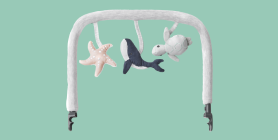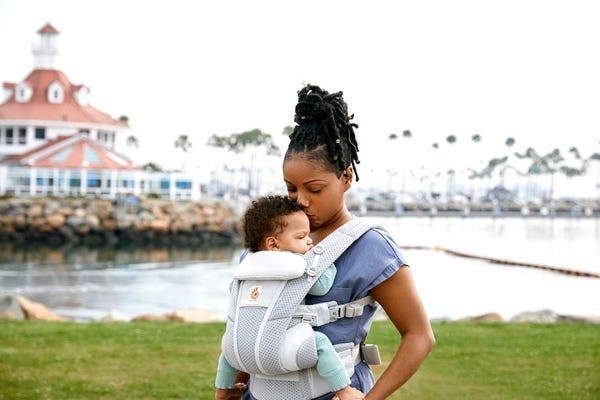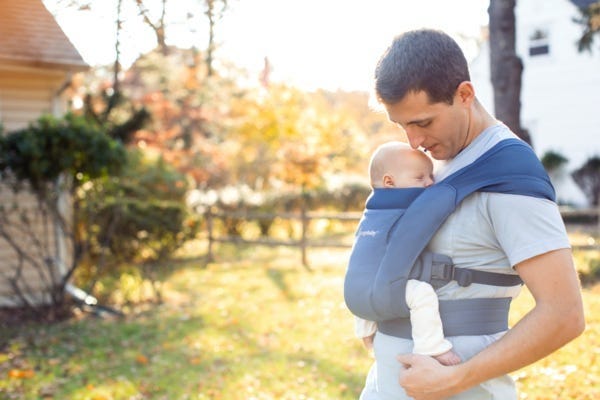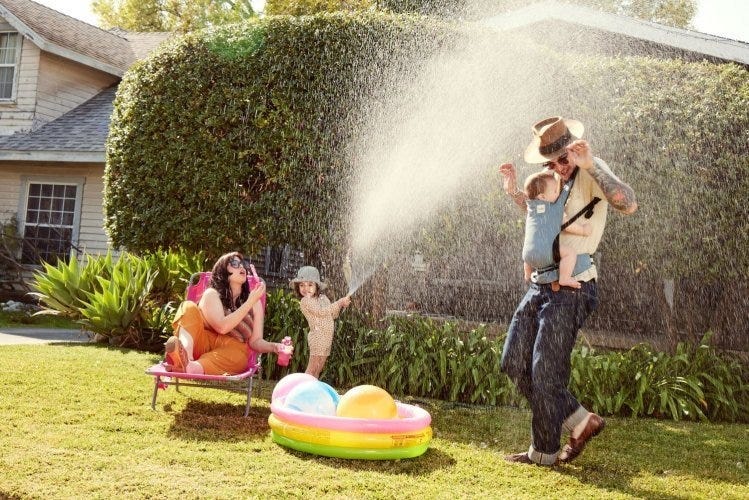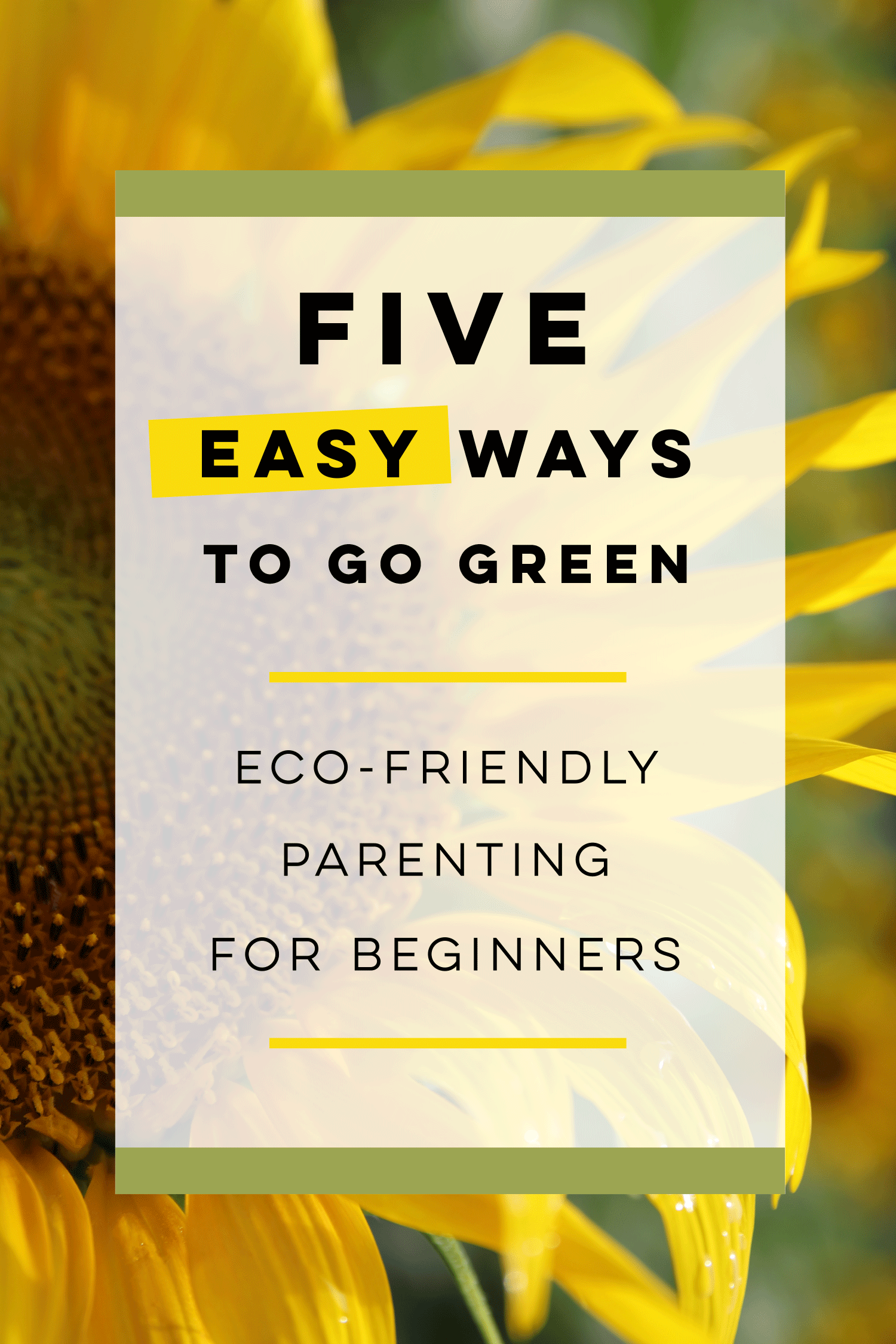
Spring is the perfect time to talk about eco-friendly and sustainable living practices. Not only is everything in bloom, full of new life, but April 22nd is also Earth Day! As parents we all want to make the best choices for our children, but often we forget to keep Mother Earth in mind. Green parenting, and choosing eco-friendly options, doesn’t have to be a tedious chore. You also don’t have to be a compost-heaping, homestead-having professional to help reduce your family’s carbon footprint. (Although if you are a compost pro, I could use some of your knowledge!) In an effort to make the world just a little bit greener, I’m sharing five super simple ways to go green as a new parent!
1. Buy Secondhand
One of the most fun parts of expecting a baby is diving into the world of baby gear! Cribs, bassinets, baby carriers, and tiny clothing… ahh! All the heart eyes! While it’s incredibly tempting to rush to the nearest baby store and stock up on all the shiny, new things, you may be able to find the very same products for far less simply by buying secondhand. By giving these items a second life, you’re saving them from piling up in a landfill. This also helps ensure you don’t add to the product demand, thus increasing carbon emissions during the production process. Can’t forget about all of that packaging, too! Purchasing quality items secondhand is a great way to help save the Earth and your bank account. Worth noting: Car seats, unless you’re fully aware of the seats history, are best purchased brand new.
2. Breastfeed
Many new mothers choose to breastfeed their babies for a whole host of reasons, but being eco-friendly may not be the first thought that comes to mind. Not only is breastmilk free, but it’s also “ready-to-feed” without the added hassle of bottles, warmers, and accessories. Breastfeeding helps guard your little one against illnesses, lowering the chances he or she will need antibiotics, too. If breastfeeding isn’t an option for your family, or you choose to feed baby from a bottle, consider glass bottles with silicone sleeves, like these from Lifefactory. You can swap the top for a sippy cup lid so the same pieces can last from birth through toddlerhood. Check out some of the informative breastfeeding posts right here on the Ergobaby blog.
3. Diaper Wisely
Parenthood is one of those funny, weird roles you can never quite prepare for. Who knew we’d spend so much time and energy considering something our child defecates in? It was a surprise for me, that’s for sure. When it comes to eco-friendly diapering options, there are typically two options that spring to mind: cloth vs. disposable. Cloth diapering has come a long way since our grandparents’ time. Today’s cloth diapers come with button snaps, velcro, pocketed inserts, and some are almost exactly like disposable diapers, but in reusable form. One “stash” of cloth diapers can, and very often does, last through multiple children. My family chose to use cloth diapers with our youngest due to the cost efficiency and environmental factors, but I recognize that cloth isn’t an option (or desire) for many families. There are many green options for disposable diapers, too. If you choose to use disposables and are looking for the right brand, consider diapers without latex, fragrances, and bleach. There’s also a third option as well: no diapers! There is a growing trend with new parents known as the Diaper-Free Movement. Parents who choose this option pay close attention to their baby’s cues in an effort to quickly transfer them to the bathroom, reducing the need for diapers during waking hours. This method is called Elimination Communication.
4. Grow Your Own Grub
While it would be totally cool if we were all self-sustainable and had homesteads with our very own farm-to-table food, it’s simply not how our society functions. That doesn’t mean we shouldn’t make the effort to grow some of our own food. If you live in an urban environment, or you don’t have a large yard to plant a garden, consider growing things like cherry tomatoes or herbs. You can grow a variety of herbs and vegetables in small containers on your patio or balcony. Herbs can even grow in mason jars on your window sill! Not only will you be able to save money - and a trip to the grocery store - but you will also be able to teach your children about how things grow, and to instill a certain confidence in themselves that will last a lifetime. Gardening can be a great way to bond with your child as he or she grows.
5. Experiences > Things
One of the easiest and most gratifying ways to go green is by skipping the toys and getting outside! Rather than stock up on toys and gadgets for birthdays and holiday gifts, opt to experience things instead, such as going to the zoo, having a picnic at the park, or just going outside in the sunshine. When we shift our focus from “stuff,” we not only help the environment by reducing packaging, transportation and manufacturing waste, but we also avoid adding to the inevitable resting ground for our junk: the landfill. Each of these changes may seem small in theory, but they make a huge difference in the grand scheme of things. By reducing our carbon footprint, even if only slightly, we’re helping shape the world our children will live in. Little changes have big impacts, and so much of this can begin before your baby is born. You don’t have to be a recycling pro to instill certain eco-conscious principles into your family’s everyday lives. Now go out there and be green!
Please use caution when attempting any of the carries, exercise or activities highlighted on this blog, social media or any other content channels. Please use common sense and caution when using a baby carrier. You should consult a physician before starting any diet or exercise program. For more information, see our Disclaimer.
Emotional Benefits of Getting Outside
Spending time in nature with your baby can strengthen the bond between you. The simple act of holding your baby close, feeling their warmth, and sharing new experiences together can create strong emotional connections. It’s also a wonderful way to reduce stress and improve your mood. When my littles were extra fussy, I’d take a walk around the neighborhood. Even though I don't live in an area with trails and surrounded by nature, simply behind outside changed everything. A little vitamin D does wonders!
Cognitive Development
Nature is a sensory wonderland for babies. The different sights, sounds, and smells can stimulate your baby’s senses and promote cognitive development. Watching leaves rustle, hearing birds chirp, and feeling the texture of a tree bark can all contribute to their learning and development.
All About Baby Carriers for Nature Adventures
Choosing the Right Baby Carrier
When it comes to selecting the best baby carrier for summer adventures, there are several options to consider.
Types of Baby Carriers:
- Wraps: Perfect for newborns, providing a snug and secure fit.
- Slings: Ideal for quick and easy use, offering good ventilation.
- Soft Structured Carriers: Versatile and comfortable for both parent and baby, suitable for longer trips.
Factors to Consider:
- Baby’s Age and Weight: Ensure the carrier is appropriate for your baby’s size and weight. For example, Ergobaby’s Embrace Newborn Carrier is perfect for the fourth trimester where baby is small and you’re looking for an easy way to stay close. As they grow, you’ll want to upgrade to an all-position carrier that’s meant for growing babies.
- Parent’s Comfort and Ergonomics: Look for carriers with padded shoulder straps and lumbar support if you’re planning on longer outings.
- Ease of Use: Choose a carrier that is easy to put on and take off.
- Climate and Breathability: Opt for carriers made of breathable fabrics to keep you and your baby cool in hot weather.
Safety Tips:
- Proper Positioning: Ensure your baby is seated correctly, with their legs in an "M" position and their head should be close enough to kiss.
- Checking for Wear and Tear: Regularly inspect your carrier for any signs of damage.
- Ensuring Adequate Support: Make sure the carrier provides proper support for your baby’s head and neck.
Exploring Nature with a Baby Carrier
Ideal Spots for a Nature Walk with Baby
- Parks and Gardens: Great for leisurely walks and picnics.
- Nature Trails and Forests: Perfect for more adventurous outings.
- Beaches and Lakesides: Wonderful for enjoying the water and sand, with the right carrier.
Activity Ideas
- Hiking: Enjoy a scenic hike with a hiking baby carrier that offers support and storage.
- Bird Watching: Use your carrier to keep your baby close while you explore and observe wildlife.
- Picnics: A carrier can free up your hands, making it easier to carry picnic supplies.
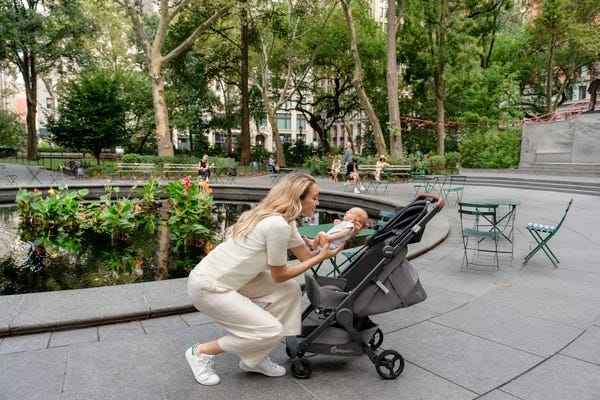

Advantages of Using Strollers for Nature Adventures
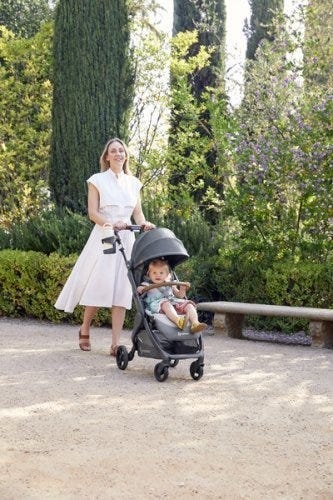

While baby carriers are fantastic for mobility and closeness, depending on the adventure of choice you might want to be a stroller along too.
There are a LOT of baby stroller options on the market. So we understand how confusing it can be to choose the one that’s right for your family. Not only are there a variety of brands, but a variety of strollers that serve different purposes.
There are a few types of strollers on the market:
- Full-sized stroller: This is typically the stroller parents thing of buying for all its versatility.
- Lightweight or umbrella stroller:These compact strollers are perfect for on-the-go adventures.
- Jogging stroller: Designed for parents who want to combine fitness with outdoor adventures.
- Double stroller: Designed for parents with multiple kids, especially twins.
- Car seat carrier: These strollers connect to a specific car seat. We don't typically recommend these as they can be unsafe for baby and uncomfortable for parents who are pushing.
Learn more about the types of strollers and which one would be best for you.
Benefits of Bringing a Stroller
- Storage Space for Gear: Ample room for carrying all your essentials like a diaper bag, beach toys and more.
- Shade and Weather Protection: Built-in canopies to shield your baby from the sun when they are lounging.
- Options: If you have more than one kid, you can stroll with one and carry the other. Or, if you’re getting warm or your little one is getting fussy, you can switch up their position from stroller to carrier or vice versa.
Safety Tips for Strollers
- Ensure your stroller is in good working condition. Make sure buckles are still buckling and that there are no rips or holes that could compromise your baby’s safety.
- Use sunshades or bug nets to protect your little one’s skin.
- Securing the baby properly: always buckle up your baby for safety even if you think they are old enough to go without the buckle.
Combining Baby Carriers and Strollers
For the ultimate flexibility, consider using both a baby carrier and a stroller on your outings.
Combining both options allows you to adapt to different situations. Use the carrier for more rugged trails and switch to the stroller for smoother paths or when your baby needs a nap.
Transition Tips
- Smooth Transitions: Plan stops where you can easily switch from carrier to stroller.
- Pack Light: Only bring essentials to make transitions easier.
Tips for a Successful Adventure
Planning Ahead
- Route Planning: Choose baby-friendly trails and parks. Check local mom groups or outdoor groups and get recommendations for the best outings for kids.
- Check Weather Conditions: Avoid extreme heat or unpredictable weather. Even with our most breathable carriers, when it’s hot, it’s hot. And having two bodies against each other in the heat will be naturally hot and sticky already.
- Packing Checklist: Include diapers, snacks, water, sunscreen, and a first-aid kit. These all-position carriers have storage pockets where you can fit some of the items easily!
- Stay Hydrated and Nourished: Pack healthy snacks to keep energy levels up and bring plenty of water for both you and baby.
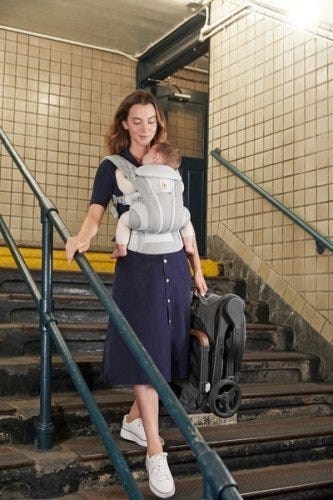

Summer adventures with your baby are a wonderful way to create lasting memories and enjoy the beauty of nature together. From baby carriers to strollers, Ergobaby products are designed to provide comfort and ease for both you and your little one. So, gear up, get outside, and explore the world with your baby by your side.
Ready to embark on your own summer adventures? Check out Ergobaby’s range of baby carriers and strollers to find the perfect match for your family’s needs. Visit our website today and start planning your next outdoor excursion!















